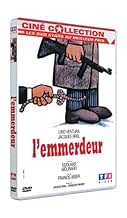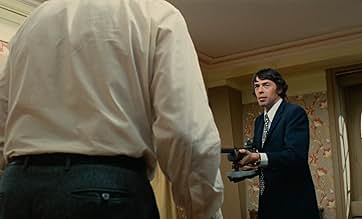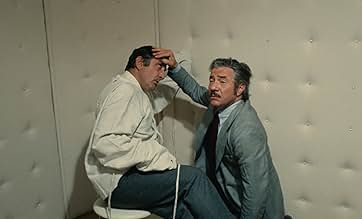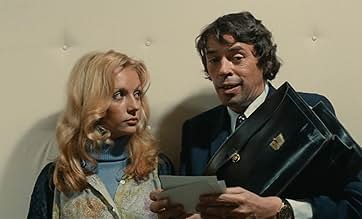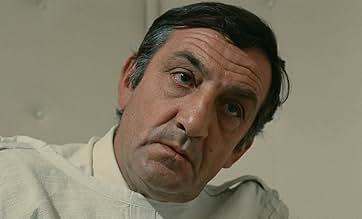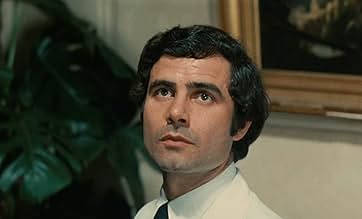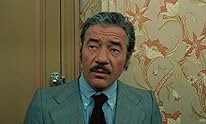IMDb-BEWERTUNG
7,0/10
3890
IHRE BEWERTUNG
Ralf Milan, ein Auftragskiller, kommt nach Montpellier, um einen wichtigen Zeugen zu töten. Er checkt in einem Hotel ein, ohne zu wissen, dass sein Nachbar neurotisch geworden ist, nachdem s... Alles lesenRalf Milan, ein Auftragskiller, kommt nach Montpellier, um einen wichtigen Zeugen zu töten. Er checkt in einem Hotel ein, ohne zu wissen, dass sein Nachbar neurotisch geworden ist, nachdem seine Frau ihn verlassen hat.Ralf Milan, ein Auftragskiller, kommt nach Montpellier, um einen wichtigen Zeugen zu töten. Er checkt in einem Hotel ein, ohne zu wissen, dass sein Nachbar neurotisch geworden ist, nachdem seine Frau ihn verlassen hat.
Liza Braconnier
- Madame Randoni
- (Nicht genannt)
Pierre Forget
- Félix
- (Nicht genannt)
Robert Galligani
- L'employé de réception
- (Nicht genannt)
Empfohlene Bewertungen
One of my favourite films. A very funny story made even more so by a brilliantly underplayed performance by Lino Ventura, portraying an hitman sidelined by a very annoying travelling salesperson played not as badly as some critics have suggested by popular songster Jacques Brel. This movie is so laugh-filled one wonders where more recent comedies so have failed. A must-see for film fans.
This film essentially is a study of characters between a loser (Jacques Brel) and a hit man (Lino Ventura).
This film, like many French comedies, has a Hollywood counterpart, "Buddy Buddy", with Walther Mathau and Jack Lemmon. Although not bad, the remake is nevertheless deceptive, as we were expecting much more from a movie in which the two principal characters are played by such great actors.
This film, like many French comedies, has a Hollywood counterpart, "Buddy Buddy", with Walther Mathau and Jack Lemmon. Although not bad, the remake is nevertheless deceptive, as we were expecting much more from a movie in which the two principal characters are played by such great actors.
What a gem is 'L'emmerdeur' (distributed in the Anglophone market as 'A Pain in the Ass'), the 85-minute film made in 1973 by Édouard Molinaro. It is a 'noir' comedy that catches Lino Ventura at the peak of his popularity built mostly on 'tough guy' roles - either gangsters or policemen - and gives the popular singer Jacques Brel the opportunity of his last big screen role (the tenth in only six years of activity as an actor). Both actors discover and use their comic resources to the maximum, in a genre different than the ones audiences know them in, bringing to screen a script full of verve and action written by Francis Veber (based on his own theater play), who would try with much less success a 'remake', 35 years later, in his last film as a director.
The story, which takes place in Montpellier, combines marital melodrama with film noir with paid assassins as heroes. Milan is sent to eliminate a witness who is going to reveal the truth about a gangster network at a trial. He rents a room at a hotel overlooking the entrance of the courthouse where the future victim will get out of the car at 2:00 p.m. His bad luck is that in the adjoing room has just checked-in François Pignon, a traveling salesman who tries in vain to arrange a meeting with his wife who left him for her psychiatrist. The desperate Pignon's suicide attempt may disrupt the assassin's plans, attracting the attention of the police, who are already on alert. Milan must try to convince Pignon not to kill himself and at the same time fulfill his mission. It won't be easy.
The impossible combination of Ventura - Brel works perfectly, to the delight of the spectators. It can be said that Ventura is playing a gangster role as he has played in many other films, but this time he is put in situations where he is very very unlucky. Brel borrows mime and comic gags from beloved comedy actors of the period. Veber's screenplay is written in such a way that the events happen almost in real time. It is one of the post-Nouvelle Vague influences, the other being the free use of the mobile camera, which takes us into hotel rooms, high up on railings and cornices outside the hotel, or in super-fast car chases, as the hero must be at the scene of the future crime at 2:00 p.m., as I said. Cinematographer Raoul Coutard had already worked with Truffaut, Godard and Costa-Gavras. The result of their collaboration is a film that uses in a professional manner the techniques of the cinematographic avant-garde to create a quality 'crowd-pleaser' that passes well the test of half a century that has elapsed since its release.
The story, which takes place in Montpellier, combines marital melodrama with film noir with paid assassins as heroes. Milan is sent to eliminate a witness who is going to reveal the truth about a gangster network at a trial. He rents a room at a hotel overlooking the entrance of the courthouse where the future victim will get out of the car at 2:00 p.m. His bad luck is that in the adjoing room has just checked-in François Pignon, a traveling salesman who tries in vain to arrange a meeting with his wife who left him for her psychiatrist. The desperate Pignon's suicide attempt may disrupt the assassin's plans, attracting the attention of the police, who are already on alert. Milan must try to convince Pignon not to kill himself and at the same time fulfill his mission. It won't be easy.
The impossible combination of Ventura - Brel works perfectly, to the delight of the spectators. It can be said that Ventura is playing a gangster role as he has played in many other films, but this time he is put in situations where he is very very unlucky. Brel borrows mime and comic gags from beloved comedy actors of the period. Veber's screenplay is written in such a way that the events happen almost in real time. It is one of the post-Nouvelle Vague influences, the other being the free use of the mobile camera, which takes us into hotel rooms, high up on railings and cornices outside the hotel, or in super-fast car chases, as the hero must be at the scene of the future crime at 2:00 p.m., as I said. Cinematographer Raoul Coutard had already worked with Truffaut, Godard and Costa-Gavras. The result of their collaboration is a film that uses in a professional manner the techniques of the cinematographic avant-garde to create a quality 'crowd-pleaser' that passes well the test of half a century that has elapsed since its release.
This is one of those films that is so funny, it makes you (well me anyway) smile just to remember it.
The essential storyline is of a professional hitman and a guy that he finds he can not get rid of. (The English translation of the title is pain-in-the-behind.)
This is black comedy done to perfection with a brilliant gradual build-up. It starts straight-faced so, if you do not know what you are watching, it could be any old thriller. Gradually the gags come in until it reaches a manic pace.
The two stars are the completely deadpan Lino Ventura and the songwriter Jacques Brel.
It is sadly under-rated and hard-to-find. Seek it out!
The essential storyline is of a professional hitman and a guy that he finds he can not get rid of. (The English translation of the title is pain-in-the-behind.)
This is black comedy done to perfection with a brilliant gradual build-up. It starts straight-faced so, if you do not know what you are watching, it could be any old thriller. Gradually the gags come in until it reaches a manic pace.
The two stars are the completely deadpan Lino Ventura and the songwriter Jacques Brel.
It is sadly under-rated and hard-to-find. Seek it out!
This is one of the last good comedies Molinaro was able to make, before he got stuck in Cage aux folles-robotic entertainment. Pairing Lino Ventura and Jacques Brel was a wonderful idea: one is so dour and methodical, the other so emotional, helpless, a real loser.
The hotel scenes are very well set up; there is a claustrophobic feeling about the layout of the suites. The water seeping through the door into Ventura's suite from Brel's bathroom after the suicide attempt prevents Ventura from concentrating on assembling his rifle--very well handled by Molinaro. The clinic scene, with Ventura ending up in a strait-jacket is a marvelous four-way comic piece with Caroline Cellier and Jean-Pierre Darras joining the two principals.
Now, if someone will bring back La Mandarine (with an impressive Annie Girardot) and L'Homme pressé, two more great Molinaro pictures from the 70's, my happiness will be complete.
The hotel scenes are very well set up; there is a claustrophobic feeling about the layout of the suites. The water seeping through the door into Ventura's suite from Brel's bathroom after the suicide attempt prevents Ventura from concentrating on assembling his rifle--very well handled by Molinaro. The clinic scene, with Ventura ending up in a strait-jacket is a marvelous four-way comic piece with Caroline Cellier and Jean-Pierre Darras joining the two principals.
Now, if someone will bring back La Mandarine (with an impressive Annie Girardot) and L'Homme pressé, two more great Molinaro pictures from the 70's, my happiness will be complete.
Wusstest du schon
- WissenswertesThe Director, Edouard Molinaro plays the barman of the coffee shop. And there's a moment that he's got a vinyl disc of Jacques Brel in his hands.
- PatzerA door is blocked with a chair under the handle. Unfortunately no one of the movie crew noticed or seems to have bothered that the door opens the other way.
- VerbindungenFeatured in Francis Veber artisan du rire: La saga Pignon (2001)
Top-Auswahl
Melde dich zum Bewerten an und greife auf die Watchlist für personalisierte Empfehlungen zu.
- How long is A Pain in the Ass?Powered by Alexa
Details
- Erscheinungsdatum
- Herkunftsländer
- Sprachen
- Auch bekannt als
- Die Filzlaus
- Drehorte
- Montpellier, Hérault, Frankreich(on location)
- Produktionsfirmen
- Weitere beteiligte Unternehmen bei IMDbPro anzeigen
- Laufzeit1 Stunde 25 Minuten
- Sound-Mix
- Seitenverhältnis
- 1.66 : 1
Zu dieser Seite beitragen
Bearbeitung vorschlagen oder fehlenden Inhalt hinzufügen


